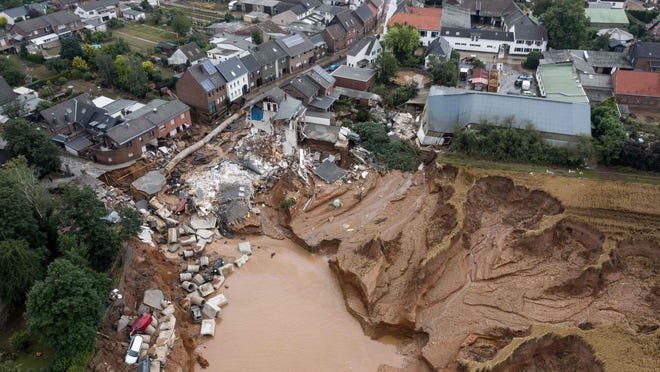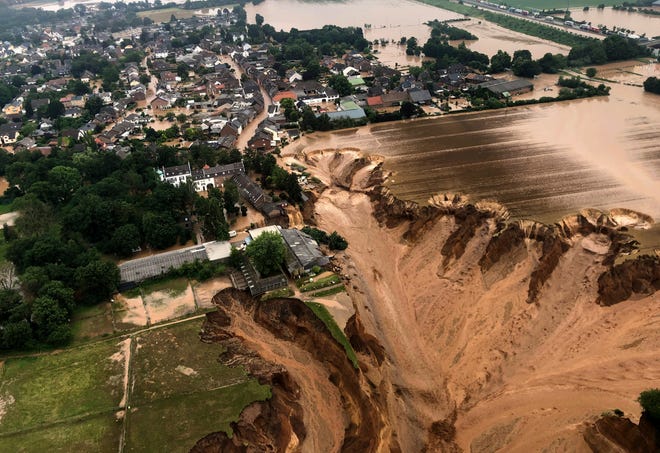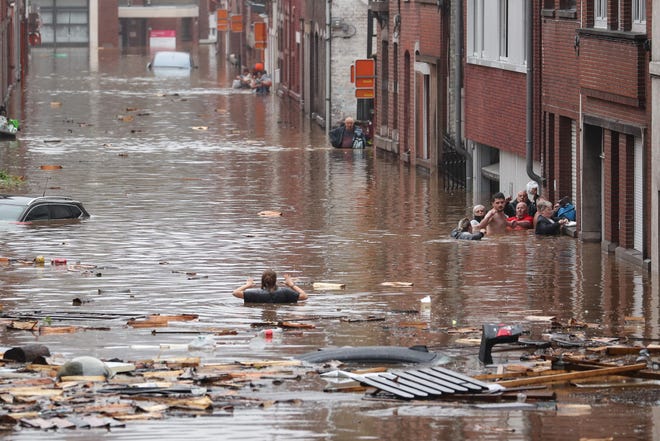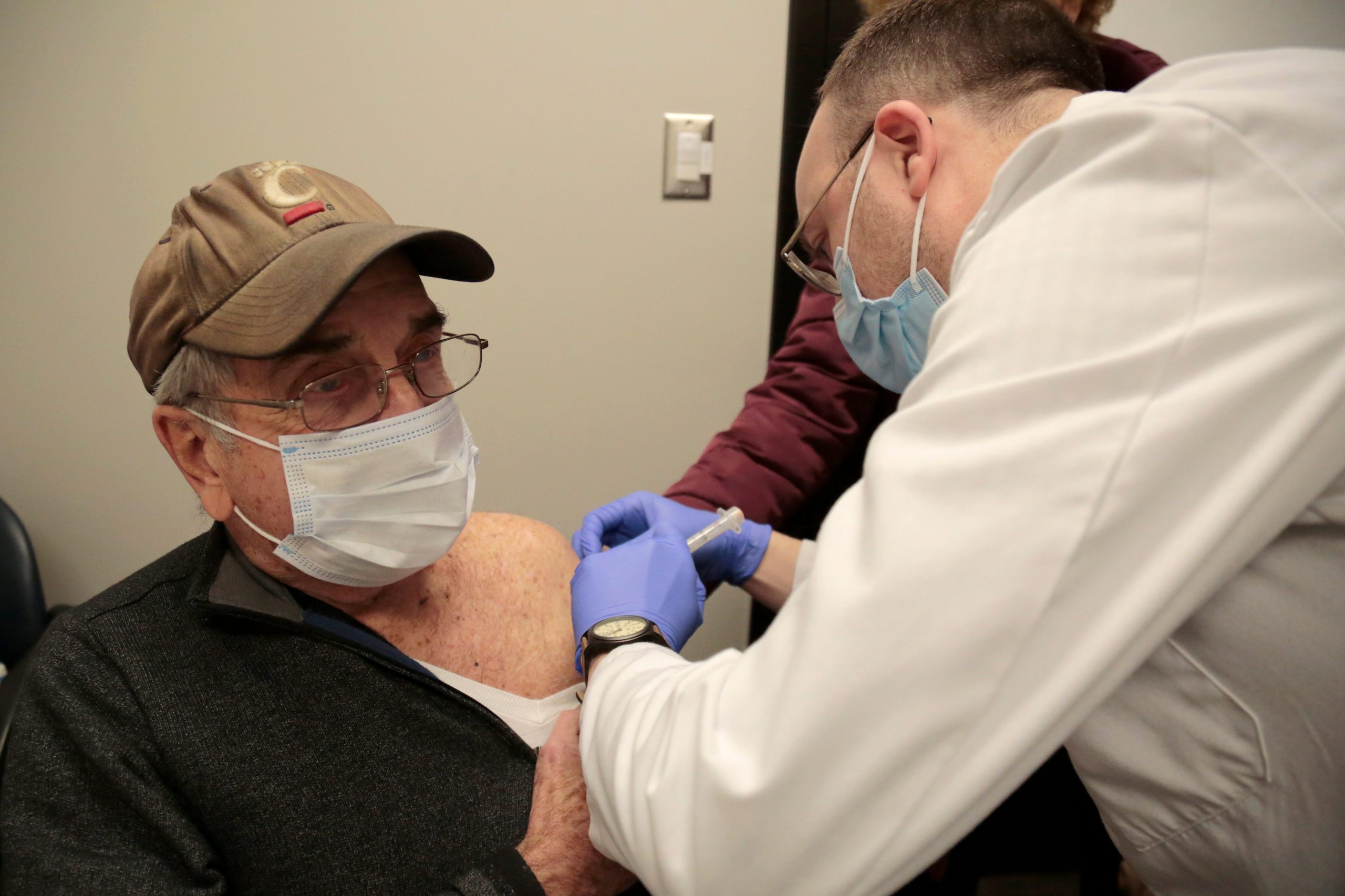
- Over 125 people have died in Belgium and western Europe due to the flooding from the week's heavy rains.
- Aerial images show a massive sinkhole in Germany, which caused the collapse of several homes.
- Italy and France are among some European nations providing aid to victims of flooding.
Flooding in west Germany and Belgium has killed over 125 people, with hundreds more missing and thousands now homeless.
Days of heavy rain turned streams and streets into torrents, sweeping away cars and causing houses to collapse with families stuck inside.
“Some parts of Western Europe ... received up to two months of rainfall in the space of two days. What made it worse is that the soils were already saturated by previous rainfall,” World Meteorological Organization spokesperson Clare Nullis said.
German President Frank-Walter Steinmeier emphasized unity Friday.
“It’s important that we show solidarity for those from whom the flood has taken everything.”
Belgian Prime Minister Alexander De Croo shared similar sentiments. Belgium will hold a national day of mourning July 20 for the victims of the flood, with De Croo announcing the country stands "shoulder to shoulder."
Here’s what we know about the flooding in Europe:
Where is the flooding in Germany, Belgium?
Cities along the Rhine River were among those hit hardest, with the German states of Rhineland-Palatinate and North Rhine-Westphalia accounting for most of the death toll.
The Belgium city of Liege was also hit hard, with numerous people drowning. Belgium estimates its death toll to be 20, and warned it may increase.
Residents of Erftstadt, a German town southwest of Cologne, were also trapped in their homes after aerial photos showed what appeared to be a huge landslide at a gravel pit.
Luxembourg, the Netherlands and Switzerland have also seen rivers swell under heavy rains.
Aerial images show massive sinkhole in Germany
Several homes and part of a castle in Blessem, located near Cologne, in Erftstadt were destroyed when the ground beneath suddenly sank.
The heavy rain Thursday flooded the Erft river and the town. According to geographer Matthias Habel, the river rushed into a gravel pit, which gave way after it could no longer handle the water.
Some people died in their homes.

Aid to the flood-ravaged region
The German military deployed over 850 troops Friday morning, but the number is “rising significantly because the need is growing,” Arne Collatz, the defense ministry spokesman, said.
Both the German Football Association and the German Football League pledged a total of 3 million euros -- $3.5 million -- to German flood victims.
“The images of the floods and devastation, the full extent of this disaster, leave us shocked and horrified,” the football organizations said in a joint statement Friday. “Our thoughts are with the relatives of the deceased, the injured and the many people in need.”
Italy provided a team of civil protection officials, firefighters and rescue dinghies to Belgium to help search for missing people. Along with Italy, France and Austria sent rescue workers to Belgium to provide "emergency assistance to people affected by the catastrophic floods," according to a statement by the European Commission.
Belgium also deployed its army to conduct search and rescue operations as people remain stranded in their homes without electricity.
In the Dutch province of Limburg, troops sandbagged nearly a mile of the dike along the Maas river as low-lying neighborhoods evacuated. Prime Minister Mark Rutte said the government was declared flood-hit regions a disaster area, making businesses and people eligible for damage compensation.

Does climate change cause flash flooding?
Nullis said it was too soon to blame the flooding and the preceding heat wave on global warming, but she did say that “climate change is already increasing the frequency of extreme events. And many single events have been shown to be made worse by global warming.”
Steinmeier blamed climate change for the flooding, calling for greater efforts to combat global warming.
“Only if we decisively take up the fight against climate change will we be able to limit the extreme weather conditions we are now experiencing,” Steinmeier said.
Experts also said that climate change could cause similar disasters to become more frequent.
Malu Dreyer, the governor of Rhineland-Palatinate state, said the disaster showed the need to speed up efforts to curb global warming.
“Climate chance isn’t abstract anymore. We are experiencing it up close and painfully,” she told the Funke media group.
Contributing: Associated Press
Source link










